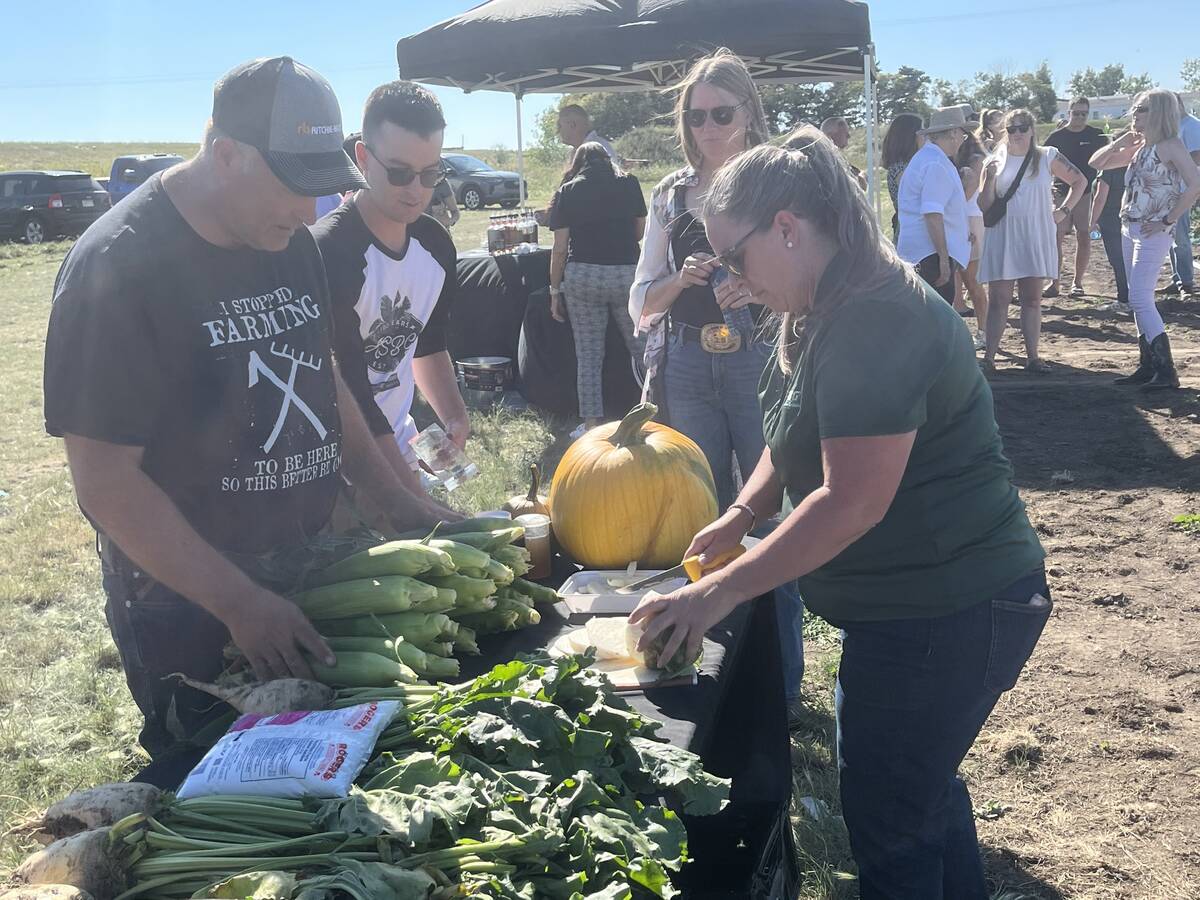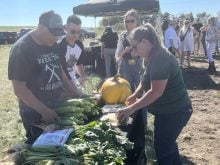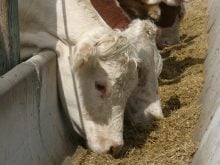Life could take a turn for the exotic, especially for the youngsters, when threshing gangs invaded the family farm
As a toddler, I thought a threshing machine in full production resembled a giant grasshopper. Expecting it to take off after me in a series of intermittent hops, I clung to my mother’s skirt in fear.
I was timid by nature and overwhelmed the first time the threshing gang invaded our house at mealtime. Attempting to escape out the back door, I was swept up by a grandfatherly Scotsman who insisted I sit on his knee while he admired the “wee girrrl with the flaxen currrls.”
Read Also

Alberta farm lives up to corn capital reputation
Farm to Table Tour highlighting to consumers where their food comes from features Molnar Farms which grows a large variety of market fruits and vegetables including corn, with Taber being known as the Corn Capital of Canada.
Worse yet was the embarrassment of being serenaded by an eccentric old bachelor who sang “You are My Sunshine” for my benefit. My older sister teased me unmercifully, extorting favours from me for years afterward by threatening to tell all my friends.
The table was crowded with huge platters of roast meat and golden corn on the cob. Bowls were heaped high with new potatoes, plates filled with thick red slices of tomatoes and fresh dills. The men ate by the feeble light of a coal oil lamp, and an occasional moth ticked against the glass chimney. I curled up in the big rocking chair by the bay window, content to just listen and watch, while the harvest moon crept slowly over the treetops and silhouetted the empty hayracks.
But then the year that I was five, Dad bought a combine.
Harvesting was nearly finished, and my mother and I were taking lunch to Dad, who was combining wheat.
Walking through the shady bush trail on our way to the field, the soft, cool grass caressed my short legs. Cottontail rabbits bounced through the undergrowth and mysteriously melted into the camouflage of leaves.
Startled by the throbbing wings of a partridge as it took flight, I ducked behind Mom’s cotton print housedress. She chuckled, and stopped to point to the hollow log where the partridge had landed. It peered back at us with beady black eyes. We walked on as a cool breeze played among the quivering leaves of the poplars.
Stepping out into the clearing of the wheat field, however, the full blast of the autumn sun suddenly pounded down upon my head. Nasty grasshoppers whirred and jumped around me. The stubble scratched my bare legs, but my dog, Tubby, had flushed out a gopher while waiting for us to catch up to him. The ensuing excitement was well worth a few scratches. I was secretly glad when the gopher escaped down a hole and Tubby came and flopped down beside me, his sides still heaving from exertion, the saliva dripping off his tongue.
I watched as our red Massey tractor with the new Allis Chalmers combine in tow steadily approached, the exhaust fumes hovering like wavy little lines in the afternoon heat.
The combine was not nearly as intimidating as the threshing machine had been, and I watched it gobble up the row of swath, noisily spitting out the chaff in swirls of choking grain dust. Dad quickly gulped down his coffee and salmon sandwiches and was on his way again.
As Mom and I stepped back into the welcome shade of the quiet bush trail, I could feel the cooling effect of the perspiration evaporating from my brow. Mom picked some ripe high bush cranberries to quench our thirst, and I squeezed the juice out of them by bursting them one at a time between my tongue and the roof of my mouth, spitting out the skins and the flat round seeds.
A few weeks later, on a calm October evening my father walked out to the field, struck a match on his rough denim overalls, and set fire to the stubble. The tongues of flame licked along in ever-changing patterns. I sat on the swing in our big front yard and breathed deeply of smoke in the autumn air, smoke that carried with it the aroma of toasted wheat, freshly baked bread and whole grain cereal.
I could see my father carrying a lighted torch on the end of the hay fork, and as he lit new fires, black patches of burned straw spread out behind the flames.
Tomorrow there would be no more stubble to scratch bare legs, but a spongy layer of soot that puffed out from under my feet in little clouds. My dog would look funny with his muzzle blackened by the soot, and my mother would banish us both to our respective baths — I to the galvanized tub and the dog to the river. But that would be tomorrow.
On this night, I just sat on the swing and watched the stubble fires as they leaped and danced across the darkness of a prairie night.
Spring had seemed but yesterday.
Summer had gone.
Winter was on its way.
I was beginning to grasp what the passage of time really meant. The desire to lead a long, full life slowly welled up within me. I had to share with my thoughts with someone, anyone, and somehow God seemed to be the only one who might understand. Did he ever listen to little girls in pigtails?
Several decades went by and one evening while travelling through the countryside I saw a farmer burning wheat stubble, his figure silhouetted against the flames. I stopped the car and a whiff of smoke drifted through the open window. I had long since cleaned the soot off my shoes and brushed the chaff from my hair but memories of that harvest home still clung to my soul.
In the intervening years, I had grown up, married, raised a family of four, was a grandmother of 11. Life was good. Life was full.
The prayers of a little girl in pigtails had been answered.















